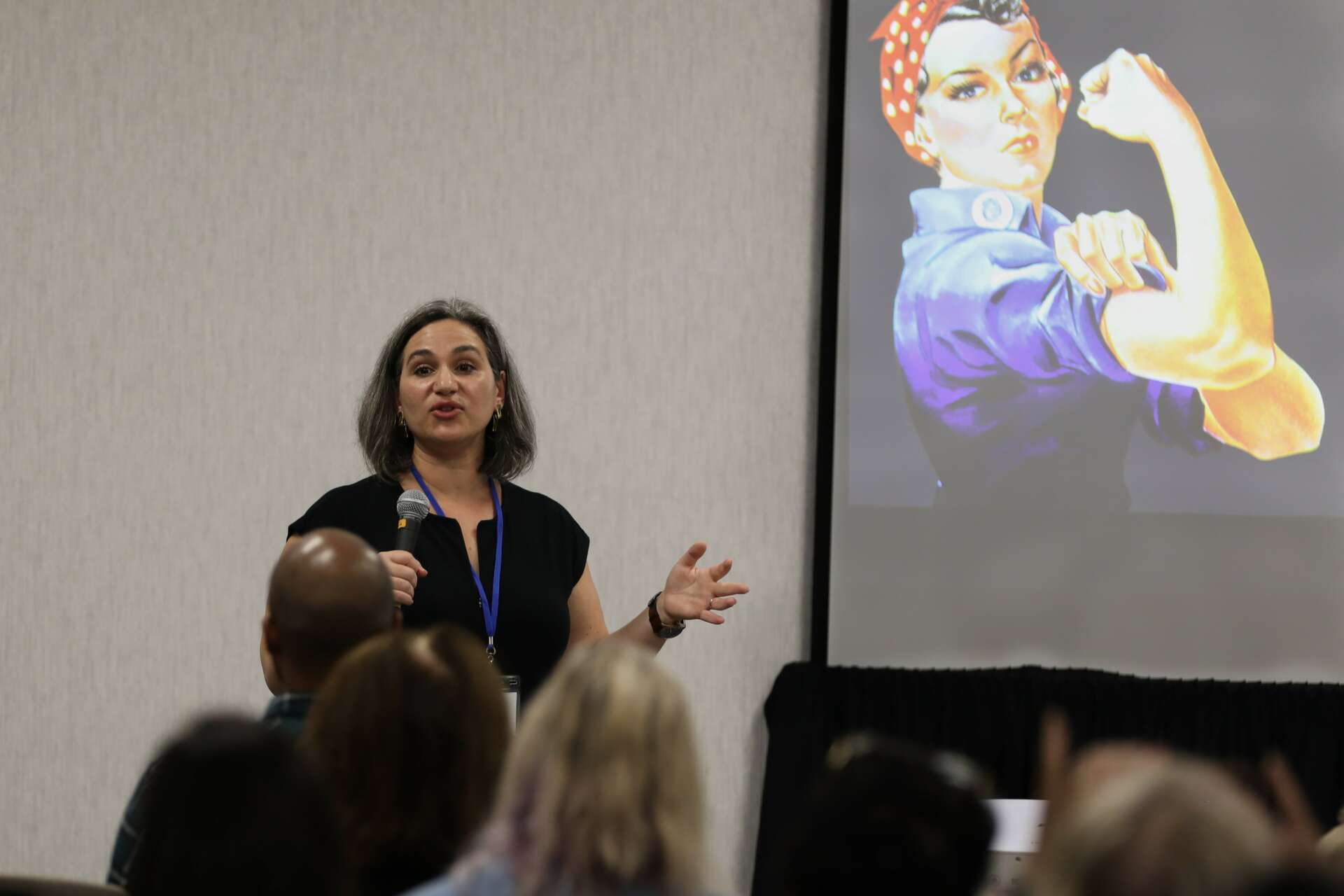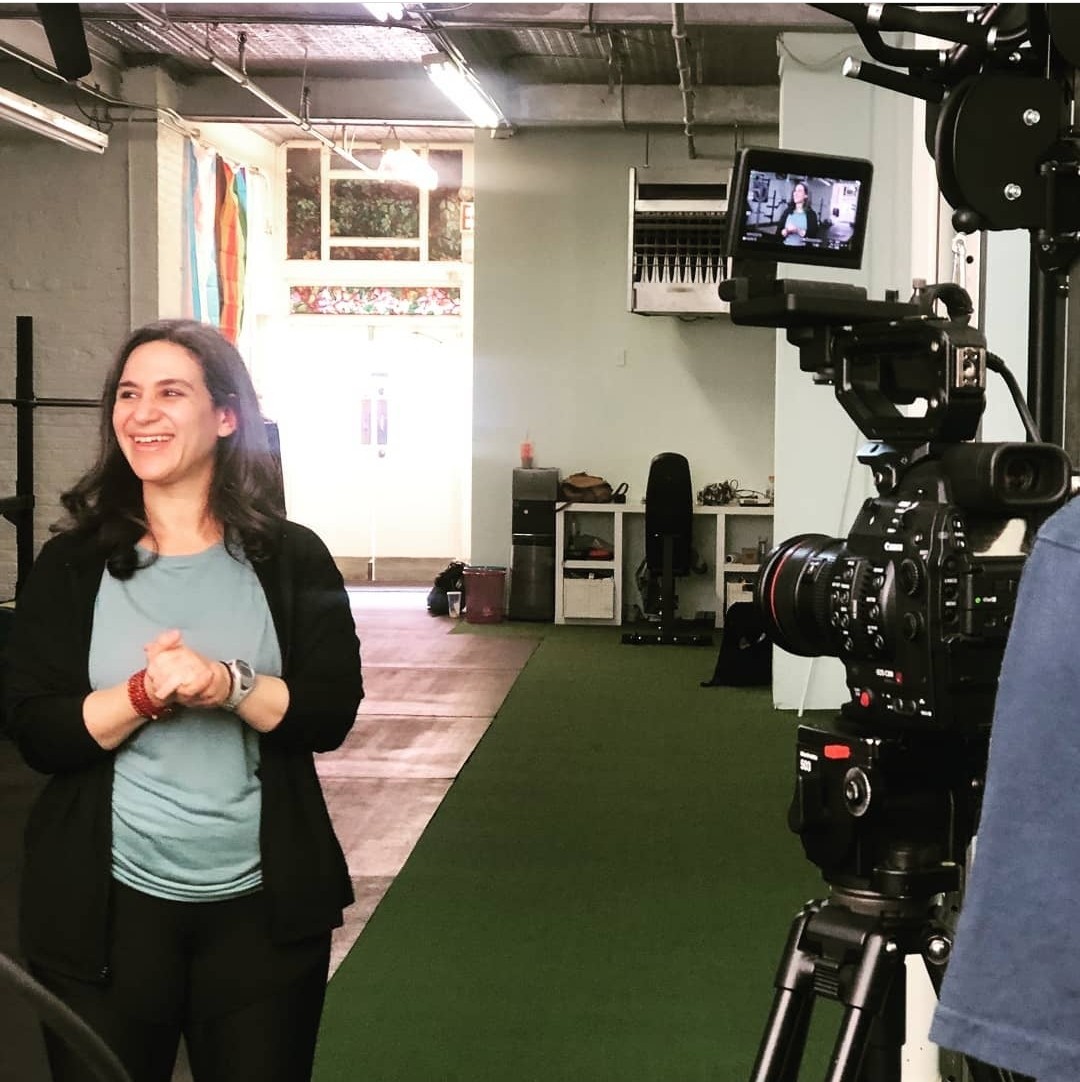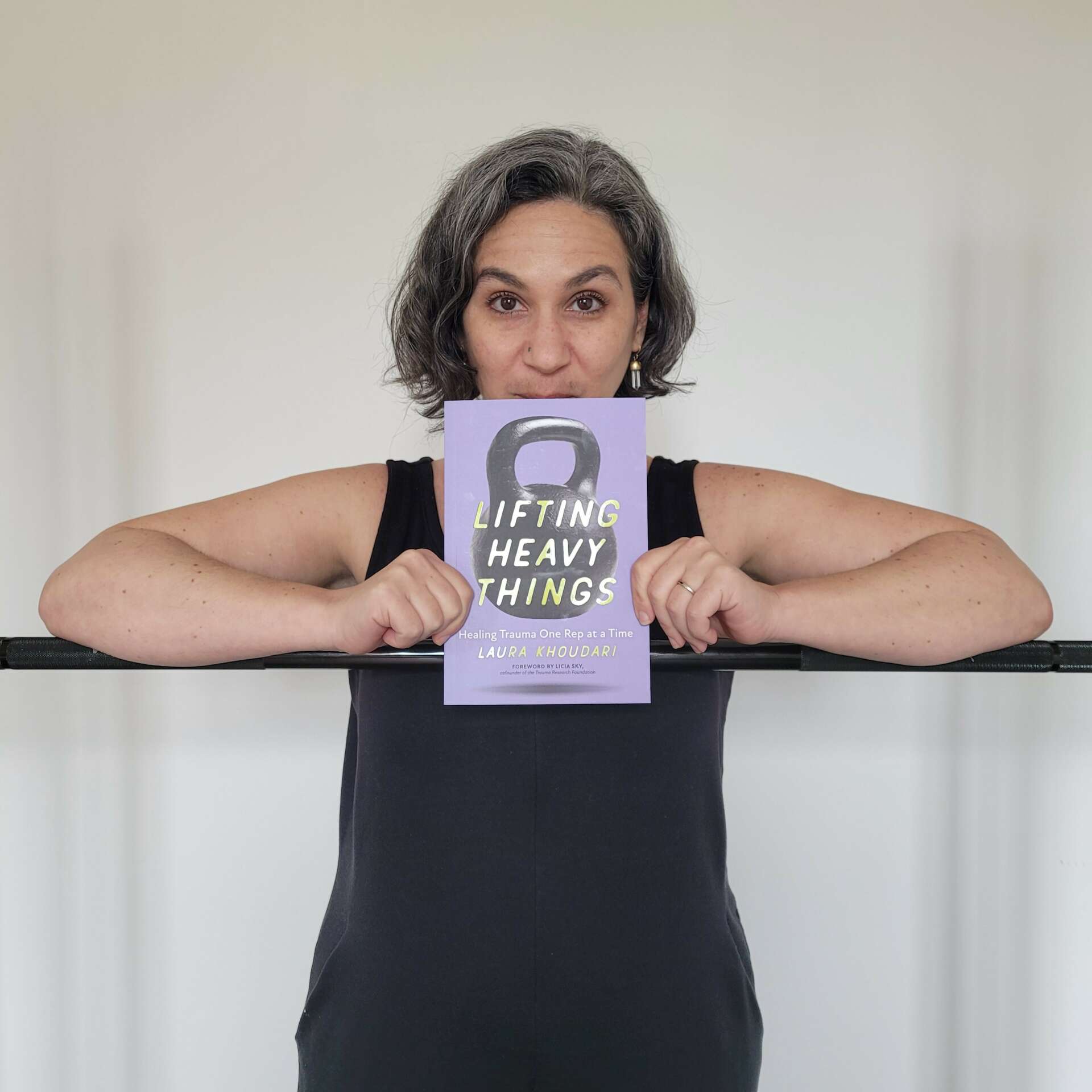We recently connected with Laura Khoudari and have shared our conversation below.
Laura, thanks for joining us, excited to have you contributing your stories and insights. Let’s start with the story of your mission. What should we know?
My work grew out of my own experience healing from trauma, not just in therapy, but on the gym floor too. In the winter of 2014-2015 I designed a holistic program to treat my PTSD that combined talk therapy, mindfulness, bodywork, and strength training.
As I pieced together a program suitable for myself, I found that practitioners who worked with the body (doctors, massage therapists, meditation teachers, and physical therapists) often did not fully understand how trauma impacted their clients and would accidentally hinder or even set back recovery. Fortunately, I found a few who were willing to learn alongside me. I read quite a bit on my own and eventually sought out teachers, trainings, and certifications on somatic approaches to healing trauma. I kept applying what I was learning and I did not just feel better, I thrived.
Frustrated that there weren’t more people in the fitness space who were equipped to help clients living with trauma, I decided to become the trauma-informed personal trainer and coach I wished I had had. I wanted to carve out a space for folks living with trauma to find support and healing in the weight room.
My programs supported my original mission to increase access to body-based treatment for individuals living with trauma, chronic stress, and chronic pain, in order to help people feel safe in their bodies, create the conditions for healing, improve their quality of life, and begin to thrive. I provided both personal training services to folks living with trauma and education for fitness professionals, doctors, talk-therapists, and folks living with trauma. I then began to write and speak frequently on issues at the cross section of mental health and fitness, ultimately publishing my book Lifting Heavy Things: Healing Trauma One Rep at a Time (Wonderwell). Deep healing was not just happening in the free weights section of the gym for both me and my clients, it was also happening for us and many more folks through storytelling.
I am delighted to share that the initial goals I set for myself have been realized. There is growing space for trauma survivors within fitness and I helped make that happen! Trauma-informed fitness has taken hold and there are wonderful programs that help fitness professionals bring a trauma-informed lens to their work now. In the process of realizing these goals I learned a lot more about myself and I want to keep connecting with and supporting healing through story. This year I stepped back from personal training and have turned my focus to writing and speaking, and I am also completing my post-graduate education as a wellness coach.
In order to reflect these changes I have a new mission:
Laura Khoudari is a leading trauma-informed wellness author, speaker, and practitioner empowering change in folks’ wellness approach. Her unique story, in unison with her training and expertise, helps her to inspire and enable people to live a full lifestyle aligned with their own values, goals, interests, and strengths.
I am excited to see where my path takes me next!



Laura, love having you share your insights with us. Before we ask you more questions, maybe you can take a moment to introduce yourself to our readers who might have missed our earlier conversations?
In both the fitness and wellness spaces we see a lot of prescriptive and judgmental language being used in both how fitness and wellness is marketed and shared. Cultural norms and commoditized self-care can make wellness feel out of reach for many folks. The way “wellness” is marketed and sold is oftentimes disempowering, dehumanizing, and harmful. And, it guts me that people who are seeking healing and greater well-being are being harmed in this way and I want to change that.
Wellness is not something that can be bought or sold– it is a way of being in the world that reflects a self-defined balance of social, emotional, spiritual, occupational, physical, environmental, financial, intellectual and occupational health. I work to help those interested in wellness and are tired or overwhelmed by superficial, one-size-fits-all approaches to it, to learn about, and experience the transformative power of defining and evolving their own unique approach to it. My primary tools for teaching are movement and storytelling.
Connecting and healing through movement and story lights me up! I believe it has contributed to my success. My work has been widely recognized by the trauma and wellness community, and she has been featured by The New York Times and NPR, among other media outlets and I have had the opportunity to present my work for Somatic Experiencing International, The Breathe Network, Reebok, Les Mills, Fitness4AllBodies, and conferences, schools, and fitness studios in the US and Canada.
We often hear about learning lessons – but just as important is unlearning lessons. Have you ever had to unlearn a lesson?
I had to unlearn a lot about what it meant to be a writer
I had been writing for years before my book came out – but mostly in secret. In high school I quietly admitted to myself that I wanted to be a writer but I also felt it would never happen because I struggled to keep up in literature classes. I have dyslexia which slows me down as a reader, and while I love to read both fiction and nonfiction, English class was always a slog. I didn’t realize until recently, that I never had the time to read close and reflect on all the books I was being assigned.
When I didn’t shine in literature classes, I jumped to the conclusion that I would truly bomb any creative writing classes, so I never took one even though I wanted to. Instead, I wrote alone for years and would sometimes self-publish anonymously in the early days of blogging. I wrote about my family, working in rare books as a young and single woman, crafting, cooking, and reading. And I would write creative nonfiction essays which I would then sometimes submit to journals, but I would seldom let people edit them so of course I never got published! I needed guidance to become a better writer but I wasn’t going to get it by writing in secret.
Once I became a trauma-informed personal trainer I began to write a bit about that too and I would quietly publish on Medium. I really never let anyone know my writing was out there. So again, I wasn’t getting help with the craft of writing nor was I actively engaging readership, and all because I was convinced I couldn’t be a writer. The greatest irony in all of this is that I was already a writer! I was writing – a lot.
In the fall of 2018 I was brainstorming e-book ideas to create a lead magnet and instead drafted an outline for an eleven chapter book that would ultimately become Lifting Heavy Things! At that moment I realized I had a book in me. I could also feel in my guts that I could write a book. I also knew I had no idea how something becomes a book. That was when I became very brave and asked for help. I enlisted the support of a friend and literary coach, Lisa Weinert, and it was through the process of writing my book that I learned (a) I had been a writer all along (b) to be a better writer I needed to show my less good writing to people (c) to be a writer who people read, you need to let people know you wrote something!
As an aside, it took many weeks of coaching before I let Lisa read any of my writing!




Any resources you can share with us that might be helpful to other creatives?
I wish I had known earlier about writing coaches and also practical courses on pitching and submitting writing for publication. If you are interested in writing as a creative outlet or just to support your work in other ways, there are so many people who can help you find your voice and your audience.
Contact Info:
- Website: laurakhoudari.com
- Instagram: https://www.instagram.com/laurakhoudari/
- Linkedin: https://www.linkedin.com/in/laurakhoudari/
- Other: https://medium.com/@laura-khoudari
Image Credits
Bethany Cheney
Viviana Podhaiski
Martine Audet


